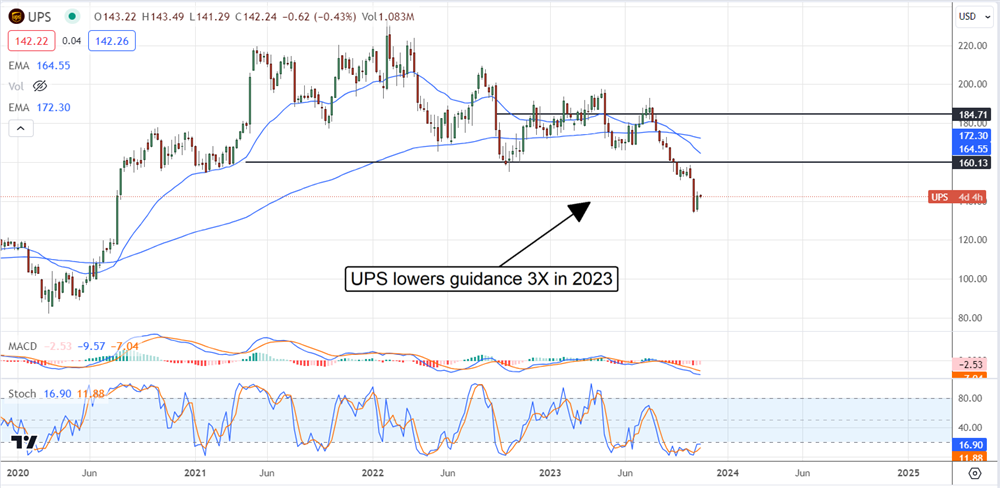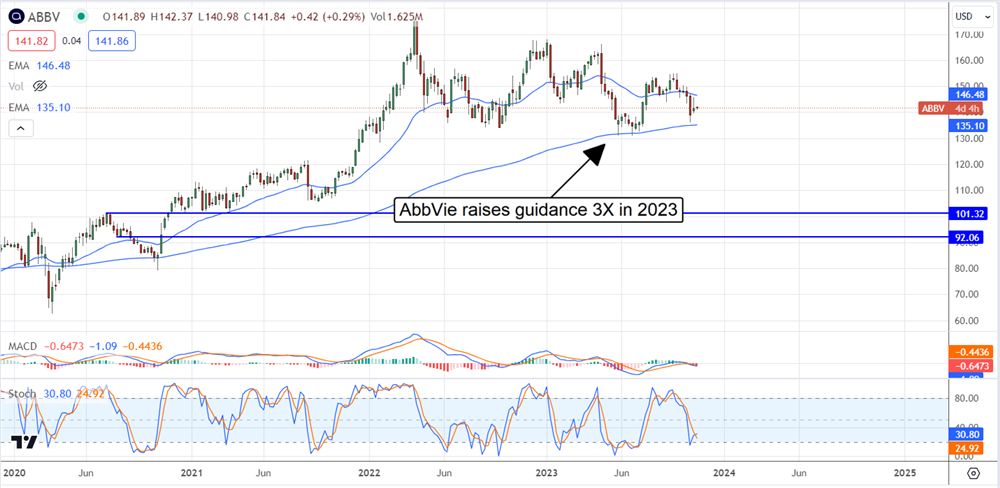
Because earnings guidance is a company's best effort to forecast its earnings, it is a leading cause of share price movement. However, simply raising or lowering guidance is not enough to move a market. If a company revises guidance, it has to be changed significantly from the analyst's estimates; if it issues new guidance, it must differ from their expectations.
Guidance that varies significantly from analysts' estimates can cause significant changes in share prices. In this regard, lowering guidance less than expected can be bullish while raising it less bearish because of what the analysts have priced into the market.
Suppose a company has a history of raising guidance. In that case, it can lead the analysts into a cycle of price target and sentiment increases that drive share prices higher—likewise, a history of lowering guidance will do the opposite. In the cases of AbbVie (NYSE: ABBV) and United Parcel Service (NYSE: UPS), we have examples of both scenarios, and the chart action is telling. The takeaway is that both stocks are high-quality buy-and-hold stocks for income investors, but one is a good buy today, and the other will become one soon.
United Parcel Service leans into efficiency
United Parcel Service has been working hard on improving operational quality, as seen in the results. The company is improving its profitability, but headwinds persist, and the outlook diminishes. The company is experiencing a downtick in volume and pricing that is sapping top-line strength and has produced consecutive underperforming quarters, including guidance reduction.
Regarding guidance, the high bar set at the end of last year has been lowered three times since, and Q4 guidance is probably optimistic. Global macro conditions have only worsened since the end of the quarter and are not expected to change significantly over the next few. The wars in Israel and Ukraine are impacting global business, while high inflation and interest rates dampen demand domestically. This means guidance for next year will likely be weak.
Analysts have lowered their expectations for Q4 but may be too optimistic. The consensus for revenue is a decline of only 5%, the strongest showing all year. Based on the Q2 and Q3 results, it is more likely that top-line results will fall by high single to low double digits, but deleveraging is the worst of the news. Earnings are expected to contract by 30%.
All that weakness has analysts lowering their price targets for the stock, weighing on the price action. However, there is a chance the market has front-run the analysts as the low price target is about 12% above recent action. The risk is that Q4 results and 2024 guidance will fail to impress, and the downtrend in sentiment will continue.
The chart action is bearish. The current candle shows a rebound from recent lows, but the rebound is weak and retraced less than 50% of the earnings-related sell-off. With guidance weak, Q4 expected to be weak, and an outlook for weak 2024 guidance, it is likely the downtrend will continue before the Q4 report is released.

AbbVie jumps off the patent cliff with a parachute
AbbVie was the poster child for pharma stocks threatened by patent expirations. Its Humira franchise is among the worst hit and is expected to drop sales by 50% or more over the next few years. However, the takeaways from the 2023 results include persistent outperformance by Humira, strength in new blockbuster drugs Skyrizi and Rinvoq, and consecutive increases in guidance. The company increased its full-year guidance after each of the first three quarters of the year and is likely to outperform in Q4.
The analysts' activity in AbbVie has been mixed this year, but a turning point was reached over the summer. Since then, the sentiment has improved to Moderate Buy from Hold, and the price target has trended incrementally higher. The analysts see the stock moving up about 17% at the consensus, and the low price target of $140 aligns with critical support. Assuming the company continues its trends, the stock price should also increase.






